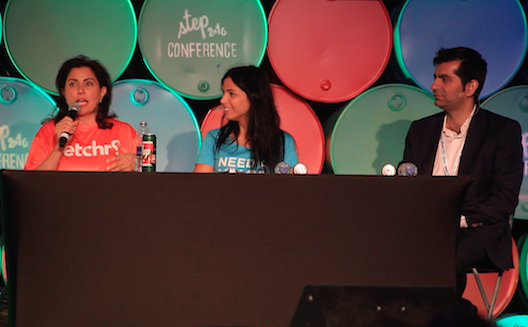Term sheets at dawn, Step Conference 2016


“I work 18-hour days, I’m lucky if I get two hours of sleep a night, I have to continually raise money, and build a company, and hire talent. To babysit the VCs, guys, I don’t have the time,” said Joy Ajlouny.
The Fetchr cofounder’s statement got everyone’s attention and then was quickly shot down with a quip from MEVP’s Walid Mansour: “Well don’t take our money then if you’re bothered by our questions.”
The “questions” the investor was referring to were those that entrepreneurs become lax, according to some, in answering once they’ve received investment funds.
There was some whooping and clapping from the audience after the brief sparring match, but it was just one of a several issues raised during the ‘Startup VC Debate’ at the Step Conference 2016 in Dubai this week.
Wamda’s Habib Haddad led a 45-minute debate, on day two of the conference, which looked at some of the preconceptions that startups and entrepreneurs have about investors, who has the bigger ego, and how these issues could be smoothed out so that the goal, to which the two sides are both ultimately working towards, could be reached with less friction.
The three VCs on the panel were keen to make the argument that the “questions” were all just part of how they were doing the best for the startup. Ajlouny agreed, but rejected the idea that VCs were always on call when it was the other way around, when the startup needed help.
“At the end of the day it’s a partnership,” said Mansour. “How can we help if we don’t sit and talk? [...] We’re your partners in the company.”

(Images via Lucy Knight)
Wamda Capital’s Khaled Talhouni interjected that indeed there was a problem if the interaction between VC and company became too deep, but that this went back to the idea of VCs thinking they can run the business better than the entrepreneur. “If you get to that point then no amount of reporting is going to help,” he said.
Craig Vachon, an investor and entrepreneur from the US who listened in on the debate, noted that if a VC was happy to say “well don’t take our money”, it showed that there was plenty of room for more VCs in this region.
Who has the biggest?
Ego, and how it might disrupt negotiations, was one of the big talking points. Khazen Baz pointed out though that it is the “putting on of a front” that could be mistaken for ego on the part of the startup.
As one listening investor put it, “we want to change this image of the cigar smoking a*****e”, an image that many entrepreneurs, before actually working with a VC, have admitted to holding.
Michelle Kuehn, cofounder of soon to be launched Dubai startup Towmydrive, told Wamda that some investors were intimidating. “It’s good that they want facts from you but when you don’t know the answer to something, and they don’t like it when you don’t know, it’s intimidating.”
The roadside assistance platform is her second startup so she has the advantage of experience when it comes to dealing with investors: she knows what she wants. “I want a partner, not always the money. I don’t want someone who’s going to make me hate what I do every day.”
"The best investors act as an extension of your team." Cofounder @MudassirSheikha on what startups need. #STEP2016 pic.twitter.com/B5VSbhiYeo
— Careem UAE (@CareemUAE) April 5, 2016
All the way to Iran
Despite the apparently high temperatures in the debating room, the Dubai International Marine Club setting for Step was actually more akin to a chilled music festival. With a grassy knoll overlooking yachts, food trucks, bean bags and a wailing guitarist, all that was missing was a face painter.
The two-day event was a melting pot of startups that included some from Qatar, India, and Morocco. An estimated 4,000 people passed through Step’s two large stage areas, booths for startups, meeting points, networking corners, and of course the food trucks.

Sorusch Amiri, Sara Mohammadi,
Avatech's Mohsen Malayeri and Parham Gohari.
Continuous panels and workshops saw discussions on everything from fundraising and its difficulties, inside and outside of the region, to the promise of unicorns to come galloping out of MENA, how important privacy is for innovation, and the landscape of the Iranian startup ecosystem.
“I wish we would be given permission to plug into the world faster and quicker,” exclaimed cofounder Sara Mohammadi. Her startup Eventbox organizes events and activities in Iran.
Straight out of Tehran, Mohammadi is keen to go beyond her country’s borders despite the fact that Iran is deemed to be the world’s largest untapped emerging market.
“It’s estimated that some $30 billion will be invested in the next five years,” said Parham Gohari from Frontier Partners.
Mohammadi is already talking to investors from outside of the country and is positive about the future of her company and where it will go.
So, when the startups in the MENA won’t take an investor's money, they just need to look to Iran, there’s plenty of waiting clientele there.


